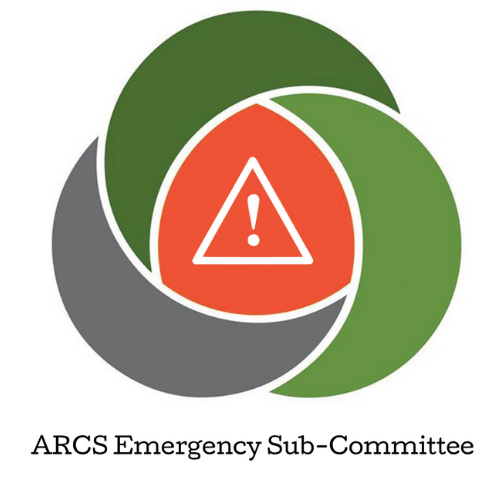Publications and Livestreams
Emergency Now! | Publications & Livestreams/Videos
Publications
Sustainable Emergency Kits: An Addendum to the Emergency Supply Program Development Manual
This document outlines the potential steps for creating a sustainable emergency kit. It is designed to be used and adapted for all cultural property institutions of any size. The recommendations stated here are not intended to be exhaustive, but emphasise the role of the Collections Specialist/Registrar while providing a general sense of the necessary processes.
Sustainable Emergency Kits: An Addendum to the Emergency Supply Program Development Manual
Theft and Vandalism Response for Registrars and Collections Specialists
This document outlines the necessary steps for theft and vandalism response within a cultural organization. It is designed to be used and adapted for all cultural property institutions (museums, libraries, archives, heritage sites, etc.) of any size. The recommendations stated here are not intended to be exhaustive, but emphasise the role of the Collections Specialist/Registrar while providing a general sense of the processes necessary considerations.
Theft and Vandalism Response for Registrars and Collections Specialists
Respuesta al Robo y Vandalismo para Registradores y Especialistas en Cobranzas
Emergency Supply Program Development Manual
The ARCS’ Emergency Programming Sub-Committee presents the “Emergency Supply Program Development Manual”; a comprehensive resource for those seeking to improve, update, or develop an emergency supply program. This document encourages emergency supply stores as a cost-effective preparedness measure against collections emergencies.
Emergency Supply Program Development Manual
Emergency Prep During Construction: A Risk Assessment Addendum
Construction projects in cultural institutions increase and change the risk to collections and cultural property. Although each construction project is unique to their institution, these questions will help an institution better prepare for any potential emergency. This document is meant to act as an addendum to the institutions’ Risk Assessment to plan for the unexpected that comes with a construction project.
Emergency Prep During Construction: A Risk Assessment Addendum
Preparación de Emergencia Durante la Construcción: Un Apéndice de Evaluación de Riesgos
Integrated Pest Management A Path Forward from Discovery: Emergency Pest Control Measures
The ARCS Emergency Programming Sub-Committee presents "A Path Forward from Discovery: Emergency Pest Control Measures," a resource for those faced with the need to eradicate pests from their cultural institutions. This is a two-tiered resource comprised of an infographic which provides a quick visual snapshot of the possible path forward, as well as a supplemental document with step-by-step instructions and additional resources.
Risk Assessment Process Manual
The ARCS’ Emergency Programming Sub-Committee presents the “Risk Assessment Process Manual”; for those seeking to complete or update a Risk Assessment. This document encourages each institution to perform a Risk Assessment to mitigate and prepare against collections emergencies, with helpful tips and resources.
Risk Assessment Process Manual
Livestreams/Videos
Safety First! Personal Protective Equipment for Collection Emergencies
May 4, 2021
Personal protective equipment (PPE) is the main source of protection for staff or volunteers working in collection emergency response. Are your emergency responders properly geared up? Check out this short video from the ARCS Emergency Planning Sub-Committee and friends to get a quick overview of important PPE to have on hand. Resources used are PPE for Emergency Response and Recovery Workers from OSHA, Personal Protective Equipment for Emergency Response from NIOSH/CDC, and Emergency Response Resources from the CDC.
Dispel the Myth: Emergency Operation Centers
March 2, 2021
The Smithsonian Cultural Rescue Initiative (https://culturalrescue.si.edu/) and The Manitoba Emergency Measures Organization (https://www.gov.mb.ca/emo/) join the ARCS Emergency Programming Subcommittee to dispel the myths of working with emergency managers and emergency operations centers. They provide helpful tips and motivation on engaging with emergency management professionals to better prepare your organization for an emergency.
Planning for the Unexpected: Daily Challenges to Collections Emergencies
July 29, 2020
Identifying and planning for hazards to collections is often done through the risk assessment process. However, we have seen the culmination of a pandemic, protests, weather emergencies, and more affect museums and cultural sites. These crises have prompted changes in emergency planning or the additions of new sections into our Preparedness and Response Plans.
Join the ARCS Emergency Sub-Committee and industry experts as they discussed adapting to the ever growing list of collection challenges and emergencies, embracing the fundamentals of planning for emergencies, all-hazard procedures, understanding scenario-based risk assessments, working within your existing plan, and adjusting to evolving industry standards. We also heard case studies from those who have successfully adapted their emergency plans to the current hazards and risks affecting museums and cultural sites.
Continuity of Operations Planning (COOP) Live Panel Discussion
May 14, 2020
To view a list of resources on COOP: ARCS COOP Resources
Continuity of Operations Planning (COOP) addresses how critical operations will continue under a broad range of circumstances. COOP is important as a good business practice, and cultural institutions would benefit greatly from having a document that establishes policy and guidance for ensuring that critical functions continue even during a crisis. Often this type of planning is neglected in other emergency planning initiatives. However, the shut down due to COVID-19 has shown just how valuable this document can be for your institution.
Please join the ARCS Emergency Sub-Committee and industry experts to discuss how collections managers and registrars should and can play an integral part in creating a COOP for their institutions. Areas of discussion will include how to be an advocate for your collections and their care during a long-term closure, how to effectively communicate with essential staff as they assist with collections duties such as environmental monitoring and pest management, and how to talk to lenders and insurers about the care of the collection while not onsite.






